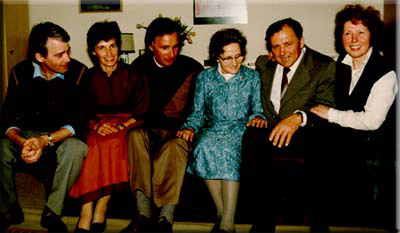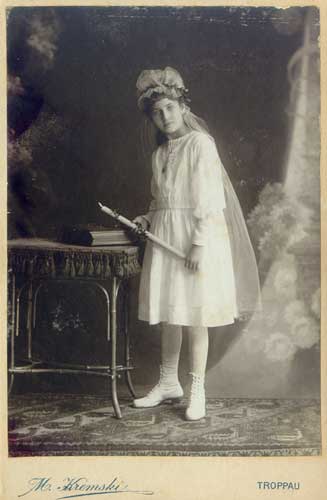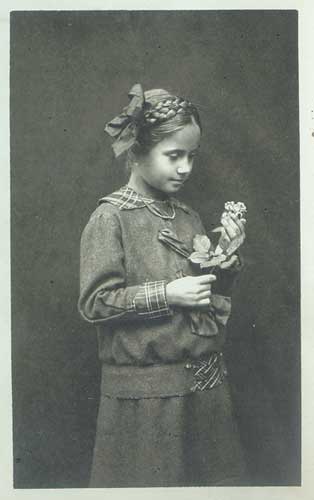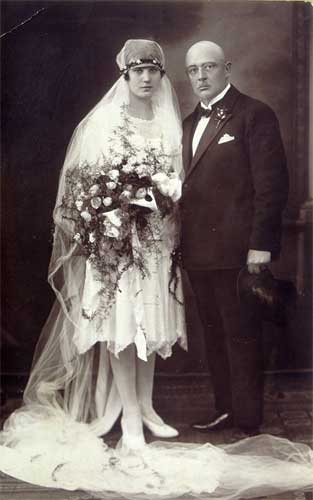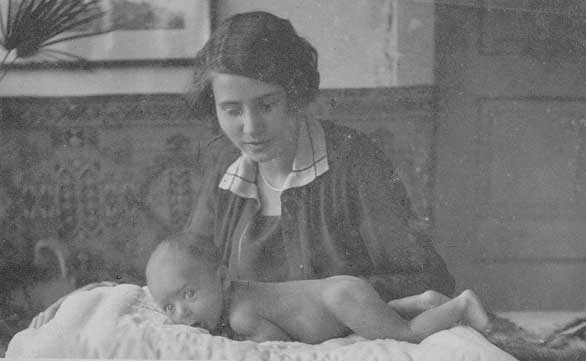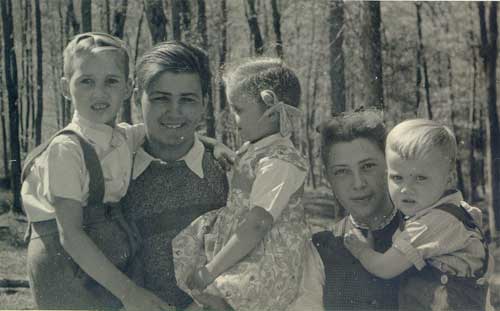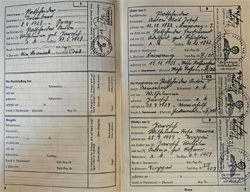Wilhelmine JAROSCH
(married 1st to PATSCHEIDER, 2nd to KNIELY)
- Born: 25 March 1909 in Troppau (CZE)
- Died: 6 March 1998 in Salzburg (Austria)
Parents:
- Father: Wilhelm JAROSCH 1862–1947
- Mother: Antonia E. ROSNER 1869–1948
Marriages:
- 1st marriage on 28 July 1927 in Maria Hilf near Zuckmantel (CZE), to Dr. med. Anton PATSCHEIDER
- 2nd marriage on 2 May 1939 to Armin KNIELY (b. 3. November 1907 in Wies, District of Deutschlandsberg, Austria; d. 30 January 1998 in Bad Hofgastein, Austria)
Children (1st marriage):
- Irimbert PATSCHEIDER, b. 8 April 1928 in Graz
- Giselheid PATSCHEIDER, b. 3 May 1929 in Mähr. Rothwasser
Children (2nd marriage):
- Klaus KNIELY, b. 24 January 1940 in Innsbruck
- Hanna KNIELY (m. LEINER), b. 8 April 1942 in Innsbruck
- Jörg KNIELY, b. 31 August 1943 in Ramsberg 97, Zillertal, Tyrol; d. 1 April 2009 in Tennenlohe/Erlangen
(Author's note: my grandmother — my father's mother)
Excerpt from the Chronicle of the Patscheiders (written in 1988 by Wilhelmine Jarosch-Patscheider-Kniely herself):
When I, Wilhelmine Jarosch, was born on Mar. 25, 1909, "all four walls were weeping" because I was a girl and not the long-awaited heir — or so my mother later described the reaction to my birth.
Nevertheless, I felt safe in the arms of my parents and was closely protected. My mother had not only lost her son from her second marriage, but also all the children from her first marriage, the Schneiders, who died in infancy.
Of course, I was often alone. I had no siblings, and my parents had to dedicate all their time to the business. Although my father strongly argued for a day off at the cooperative, his request was ignored — not even Christmas Eve was kept free for the family. I sat alone under the tree with my many gifts. One year there was a beautiful toy piano among them, and it probably awakened my musical inclinations, an inheritance from the Rosners.
In 1914 the First World War broke out. My parents leased their inn and moved to Braunsdorf. My father had agreed to manage the Krause-Hof since Uncle Albert was immediately drafted into the Austrian army. My father took on this task with great enthusiasm, leading groups of Russian prisoners of war to work in the fields. They and the local population respected him for his honesty, despite him being a city man. As a result, he was awarded honorary membership in the Braunsdorf volunteer fire brigade. In 1915 I began attending the local elementary school in Braunsdorf, and despite the war and its hardships, I greatly enjoyed those years. I always had playmates, and life in the countryside suited me very well.
In 1916 we returned to Troppau, as my father had to run his inn himself again because his tenant had been drafted. It was a difficult time: there was hardly any food. We had painstakingly obtained a barrel of beer somewhere, which my father and I had to transport home through town on a ladder trolley, since the usual horse-drawn carts were on war duty. The inn was literally stormed — for a mug of beer!
The year 1918 came. Austria had lost the war, and overnight we all became Czechoslovak citizens — a state that had not previously existed on any map. At that time I attended the training school, which was housed in the former Liechtenstein castle. When I entered the 3rd grade, my parents gave me a grand piano and so I began to play the piano, which became an important part of my youth. After the five years of primary school then prescribed, I attended the three-year civic school. In the years after 1918, we had to change school buildings again and again, as the new rulers frequently claimed our historic buildings for themselves.
After these school years, my parents sent me to the boarding school of the Poor School Sisters (Jauering district). There I made many friends, some of whom I am still in contact with today.
When I returned to Troppau, I began piano studies with Professor Keitel. In addition, I took literature and art history classes with Professor Theresia May, attended a white sewing course, and at my father's special request, graduated from hospitality school in order to keep the family concession. I hardly had a free minute, so I gratefully accepted the invitation to attend the jubilee festival of the Braunsdorf fire brigade at Whitsun 1927, on behalf of my father, where I stayed as usual in the Krause-Hof. This festival was to be the great turning point in my life: my meeting with Dr. Anton Patscheider.
End of chronicle excerpt (written in 1988 by Wilhelmine Jarosch-Patscheider-Kniely)
Excerpt from the Patscheider Chronicle (written in 1988 by Mag.a Giselheid Patscheider-Riedmann):
On July 28, 1927, Wilhelmine Jarosch married Dr. Anton Patscheider at the pilgrimage church of Maria Hilf near Zuckmantel. The engagement was brief, but the groom was eager to marry, sensing that his time was limited. Over the next eight years, the couple faced many challenges. Although Wilhelmine was only 18 years old at the time of her marriage, she quickly had to learn to manage a large household and fulfill the responsibilities of a doctor's wife in the countryside. Their shared love of music, however, strengthened both their bond and their resilience.
Dr. Patscheider's health suffered from overwork and the harsh climate of Moravian Rothwasser. The couple therefore sought refuge in Wies, in southern Styria, where they stayed with Dr. Paul and Marie Kniely for a few months. During this time, their son Irimbert was born in Graz on Easter Sunday, Apr. 8, 1928. After returning to Moravian Rothwasser and spending another year there, the couple welcomed their daughter Giselheid in May 1929. However, Wilhelmine fell seriously ill with puerperal fever and needed months to recover.
Soon their living space became too small, so they built a modern house opposite the hospital. This marked the beginning of a new era for the family. Dr. Patscheider continued his work at the hospital, which he had expanded, and built a wide circle of friends. He often hosted midday meals for school classes, serving fresh rolls from a large laundry basket with hearty soup. The Sisters of St. Hedwig, whom he had called to the hospital from the Motherhouse in Wroclaw, served him with devotion and love, and their beautiful handicrafts are still partly in the narrator's possession today. Dr. Patscheider showed his gratitude by building a lovely chapel next to the sisters' wing.
The chapel was consecrated by the Bishop of Olmütz in December 1935, bringing great joy to the hospital. However, on the very day that the celebrations ended, Dr. Patscheider fell ill with pneumonia and passed away on Dec. 15, 1935, leaving behind a legacy of love and kindness.
At the age of 26, Wilma Patscheider became a widow. She received support from her parents and also from her sister-in-law Marie Kniely. The house in Moravian Rothwasser was sold, and her parents, the Jarosch family, moved back to Troppau — first to Obere Stiegengasse, and later to their own house at Bäckergasse 39. Irimbert and Giselheid continued their primary schooling at the Schiller School.
On May 2, 1939, Wilma Patscheider married Marie Kniely's son, Armin KNIELY (b. 1907), a trained farmer. She moved with her children to Ramsberg 87, an idyllic house on the Eckartbach in the Zillertal. Around this time Hitler was in power, Tyrol had become part of the Greater German Reich, as had the Sudetenland. The Second World War broke out, death and destruction spread across Europe, but in spite of bombs, hatred and terror, new life was born during these wartime years. Wilma gave birth to three more children. Klaus Harald (b. Jan. 14, 1940) and Hanna (b. Apr. 8, 1942) were born in Innsbruck, and Jörg (b. Aug. 31, 1943) became a true Zillertaler.
The turmoil of the post-war years robbed the Jarosch parents (d. 1947 and 1948) of their home and possessions. Yet peace returned. In the first year of peace, this picture of the five siblings was taken — in the background still the meadow beloved by all, in spring a sea of wood anemones. It later fell victim to the torrent, but it still lives on in our childhood memories.
End of chronicle excerpt (written in 1988 by Giselheid Patscheider-Riedmann).
Note from Patscheider Wolfgang:
After her divorce from Armin KNIELY, she moved with her children to Kufstein, where she worked as an accountant. She spent her retirement in Salzburg, where she passed away on 6 March 1998.
Regarding Mährisch Rothwasser: this place is located in today's Czech Republic and is now called Červená Voda!
Regarding Troppau: this is the Czech town Opava!
Sources (italicized are original contents):
- Dr. Richard Patscheider: "Vom Oberrhein zum Etschquellraum" page Z25 and Z26:
Anton gb. 1882 XII. 12 in Berwang, h. 1911 V. 29 Julie Gerber aus Kufstein + 1925 in Mähr. Rotwasser.
2. Ehe a. 1927 VII. 28. Wilma Jarosch aus Troppau / Anton + 1935 in M. Hilf b. Zuckmantel. (Eltern: Jarosch Wilhelm und Antonia Rosner, Braunsdorf.). - "Ahnenpass" (ancestry certificate) Irimbert Patscheider page 9, No.: 3:
Jarosch Wilhelmine Rosa Maria
Born 25.3.1909 in Troppau Baptism Reg.-No. XIX/407 Parish Office Troppau
Marriage 28.7.1927 in Mariahilf with Anton Patscheider Parish Office Zuckmantel, Reg. No. VI/288 - Patscheider Chronicle:
see text above.
Comment:
Both the "Ahnenpass" (ancestry certificate) and the personal accounts in the chronicle are credible and therefore provide a good data basis.
Wilhelmine was my grandmother, and I know much from her personal accounts.
